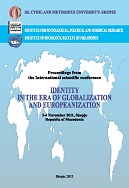WAS FUKUYAMA RIGHT - HAVE WE REACHED THE END OF HISTORY OR THE STRUGGLE FOR RECOGNITION NEVER ENDS
WAS FUKUYAMA RIGHT - HAVE WE REACHED THE END OF HISTORY OR THE STRUGGLE FOR RECOGNITION NEVER ENDS
Author(s): Dijana Stojanovic DjordjevicSubject(s): Politics / Political Sciences
Published by: Институт за социолошки и политичко-правни истражувања
Keywords: Francis Fukuyama; globalization; liberal democracy; end of history
Summary/Abstract: The end of the Cold War marked the beginning, not only of economic, but also of political liberalization. States began to let up and faced the growing demands of its citizens to participate in the process of making and implementing decisions and policies. Thus the world reached a silent consensus about the legitimacy of liberal democracy as “the best system of government, devoid of deep disadvantages and contradictions which would lead him to collapse”. This system according to Francis Fukuyama is the endpoint of the evolution of ideologies - drivers of human activity. Liberal democracy is the maximum that modern man can achieve, and because of that, for Fukuyama it represents the “end of history”. However although life in democracy is full of benefits, its residents are free, equal before the law, enjoy numerous rights, they are controllers of the government that govern on their behalf and for their own good, still cannot be given precise and only answer to the question is it everything so perfect? Modern societies, despite their “democracy” are not homogenous, but rather even more highlight the cultural, religious and linguistic differences between them. The modernization of societies and the increased interaction between people through electronic communication, mass and social media, trade and tourism leads to a great exchange of knowledge, attitudes, opinions and ideas. Modern man is increasingly seeking to highlight its own identity through the things that distinguish it from the other, fearing not be blended with the majority. On the one hand, with increasing economic and political power of the societies, they seek to influence the creation of a global and universal culture, in which they will have the biggest impact, and on the other hand citizens of these societies begin to define their identity through tradition and religion. Therefore modern societies contain certain contradictions which may be a source of dissatisfaction of the citizens, and thus lead to their mutual destruction. So the question remains, whether the man who lives in a liberal democracy is even more satisfied with his live, that there is no longer need to fight and look for something more?
Journal: Proceedings from the International scientific conference
- Issue Year: 2012
- Issue No: 1
- Page Range: 161-166
- Page Count: 6
- Language: English
- Content File-PDF

